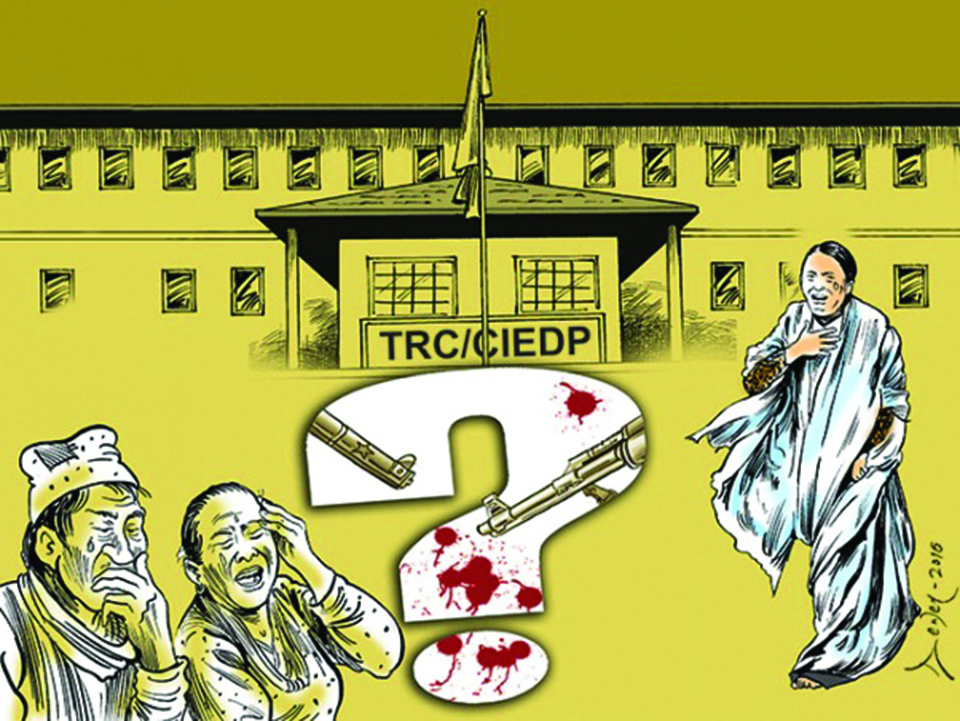Nepal’s transitional justice process is getting prolonged further while the victims of the atrocities carried out by both the state forces and rebels during the decade-long Maoist insurgency are still waiting for justice. This is a great injustice to the victims and betrayal to the national cause of finding the truths about extra-judicial killings and other atrocities that took place during the war. This is no time for complacency. The Sword of Damocles of international investigation hangs over some former Maoist leaders. They apparently fear traveling abroad and the international community seems increasingly concerned about the delay in conclusion of transitional justice. It is getting late for the government to appoint the commissioners and other officials in Truth and Reconciliation Commission (TRC) and Commission of Investigation on Enforced Disappeared Persons (CIEDP) because these twin bodies remain headless ever since the chief commissioners resigned after their term ended in February this year. The Parliament in February passed the legislation to give new lease of life to TRC and CIEDP for one year (and one more year if needed). But the key tasks of amending the TRC Act and appointing commissioners in these bodies are yet to be accomplished. As a result, the transitional justice process remains stuck in inaction. This way, we won’t be able to conclude the only remaining tasks of the peace process—providing justice to the victims of war and ensuring non-recurrence of conflict.
Heed the suggestions of UN Secretary-General on transitional ju...

What is behind this delay is obvious. Both ruling as well as opposition parties want to appoint persons close to them at the helm of TRC and CIEDP. And they seem least bothered about how and whether the TRC and CIEDP that will be reconstituted will be able to own up tasks accomplished by these bodies—as of February this year TRC and CIEDP were working on 61,000 and 3,000 complaints respectively, TRC had concluded preliminary investigations into about 3,000 complaints while the CIEDP had investigated some 2,100 complaints—and deliver justice to the victims. Besides, they also seem least concerned about amending the TRC Act in line with the spirit of the constitution, Comprehensive Peace Accord-2006, Supreme Court’s ruling and human rights conventions and declarations to which Nepal is a signatory. This is unfortunate and unfair, for it will push the fate of transitional justice in limbo.
Meanwhile, victims groups have been demanding that the government put on hold the works of the committee formed to recommend new officials at TRC and CIEDP. They argue that ongoing selection process is not fair and the government is working unilaterally, without consulting the victims’ communities. On Thursday, Conflict Victims’ Common Platform (CVCP) submitted a memorandum to the Minister for Law, Justice and Parliamentary Affairs Bhanu Bhakta Dhakal demanding that the government should formulate a broader roadmap with a deadline for completion of the transitional justice process after a meaningful consultation with the key stakeholders before new officials are appointed in TRC and CIEDP. Their other demands include amendment of TRC Act, making the new commissions independent, autonomous and proactive with fixed jurisdictions and appointing leadership at TRC and CIEDP through a transparent and credible process. They want the government to consider persons with no direct or indirect involvement with any parties to the conflict as commissioners. CVCP’s position is valid and the government should not ignore their concerns because without competent officials at the TJ bodies and without proper consultation with concerned stakeholders—mainly the victims— transitional justice cannot be resolved meaningfully. The bottom line is transitional justice process should be transparent, trustworthy and with participation of as many stakeholders as possible.


































